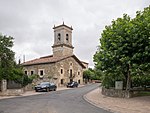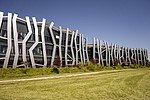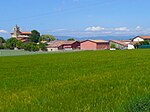Errekaleor is a neighbourhood on the periphery of Vitoria-Gasteiz, in the Basque Country, Spain. It sits on the plateau created by the Errekaleor river, which is part of the Green Belt of Vitoria-Gasteiz. From 2013 onwards, the area was occupied by squatters and became known as Errekaleor Bizirik (Errekaleor Alive). The project is based on the principles of workers' self-management (autogestión), consensus based decision making, feminism, anti-capitalism and Basque cultural re-invigoration. The neighbourhood is the largest occupied space of its type on the Iberian Peninsula, with over 10 hectares of land and 150 inhabitants. Residents include children, the elderly, blue-collar workers, the unemployed, students, and teachers. The project includes an organic farm of 2 hectares, a bakery, a bar, a social centre, a library, a theatre, a free shop, a recording studio, and other projects.
The area is made up of 32 blocks (Basque: 'bloke', Spanish: 'bloques') that hold six apartments each, as well as a number of buildings that were built as part of the original development, such as a school, church and shops, which have now been renovated by the Errekaleor Bizirik community. The neighbourhood has existed since the 1950s, but fell into disrepair and was largely abandoned after the Vitoria-Gasteiz city government evicted the original residents in order to develop the area with modern apartment complexes. Due to the European debt crisis, these plans were never carried out, and the area was almost entirely unused for years before the occupation began.










